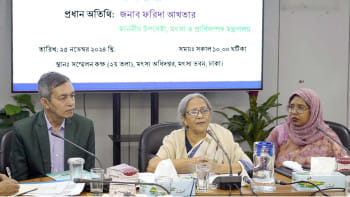“Living one life in two countries”

A columnist in The Daily Star recently gave an apt description of many like me who are "living one life in two countries". 'We' are those who have migrated from our country, yet cannot give up the ties with our roots. We are so entwined by the umbilical cord of our motherland that it pulls us back for reasons that can only be in one's self-interest of being further nourished, as a child demands of her mother. We enjoy the material comfort of the migrated land but crave for the caring embrace of the nation that raised us during our childhood. Why do we suffer this dilemma? Why can we not settle with the decision we made decades ago of leaving behind family, friends, home and everything that is comfortingly familiar? I am yet to come up with a satisfactory answer to the question.
Yes, it is a privilege to live one life in two countries if only one can. It's a prized rarity to enjoy the best of two nations. However most often, it is a split between family responsibility and loyalty to one's own soul. For many, it is a situation that deprives them of enjoying one of the basic expectations of life: to work and live where one wants to, yet share the same geographical space with one's own family. For most people, migration is hardly rosy, whether it is within the country or crossing borders and oceans. For the majority, it is a matter of survival, the push factors behind migration being either economic or political. At the end of the day, it is an outcome of the failure of the State to provide the preconditions for its citizens to live a financially stable life and/or in safety, free of social, religious or political persecution. According to World Bank data, Bangladesh was the third largest country with a negative net migration (immigration minus emigration) during 2011-15, after Syria and India. In Syria, around four million people were driven from their country as a result of political conflict over the period (currently, the figure is roughly five million); more than 2.2 million people emigrated from Bangladesh for a better economic future. This has given the nation an income of more than $15 billion in the form of personal remittances during the fiscal year 2014-2015 alone.
Let's take a moment to focus on possible experiences of the individuals behind the statistics from a mental health perspective. Researchers (Bhugra D, Acta Psychiatr Scand 2004, 109: 243–258) point out that migration is not simply a one-off phase but a series of events often spanning over a long period of time, starting with the pre-migration stage which possibly determines whether the move is voluntary or forced. A literature review of scientific research on migration and mental health in Europe (Carta et al.,Clinical Practice and Epidemiology in Mental Health, 2005, 1:13)refers to the psychiatry of migration as a grieving process, experienced over time and causing anguish. The process is described to include seven major losses: family and friends, language, culture, homeland, loss of status and contact with the ethnic group, and finally exposure to physical risks. The process is, of course, far more complex for those fleeing persecution of any kind. Epidemiological studies in different European countries suggest higher rates of schizophrenia amongst immigrants (even after controlling for political refugee status) compared to nationals. It is interesting how two sides of the same coin can be perceived so differently: the emigrant in her homeland with the strength of earning hard foreign currency and enjoying a life of comfort, and the vulnerable immigrant in the recipient country experiencing social adversity in terms of employment, living conditions and social exclusion, thus impacting mental health.
Coming back to being split between two countries, physically living in one and spiritually dwelling in the country of one's origin, I would like to draw attention to channelling such predicament into a positive force for our nation. Late last year, the Director-General of the World Health Organisation reminded delegates at an international conference of the benefits of migration, that of "bringing new ideas and an energetic and highly motivated workforce". Bangladesh is a country that welcomes foreign skills with open arms. Private universities employ foreigners to promote an international image. Businesses are routinely importing foreign labour. Consulting firms seek out foreigners to help attract consultancies who are generally hired by donor organisations, consequently channelling back their own funding outside Bangladesh. Maybe it is time for Bangladesh to contemplate reverse migration by bringing home its own skilled workforce from abroad and get a return on the investment she made in nurturing her progeny.
The writer is Associate Professor of Public Health, Karolinska Institute, Sweden.


 For all latest news, follow The Daily Star's Google News channel.
For all latest news, follow The Daily Star's Google News channel. 



Comments